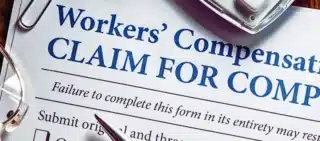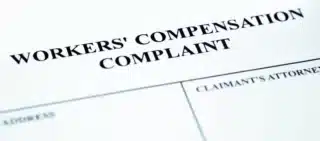
At Strong Law Offices, we have a team of workers' compensation lawyers who understand the financial setbacks and physical limitations...


Wondering, “Can I sue my employer for a workplace injury?” You may be able to sue if your employer intentionally harmed you, did not have workers’ compensation insurance coverage, or was grossly negligent when failing to provide a safe workplace.
However, the Illinois Workers Compensation Act prohibits injured employees from suing their employers for workplace injuries and occupational illnesses under the exclusive remedy rule in most situations.
The legal options available to you will depend on the circumstances surrounding your work-related accident. A work injury lawyer at our law firm in Bloomington can evaluate your case and provide you with free legal advice about how to recover compensation for your losses.

The exclusive remedy rule is a principle in workers' compensation law that limits an employee's options for seeking compensation after a work-related injury. In most cases, the rule prevents injured workers from suing their employers. It aims to streamline the process and create a predictable system for both parties. Here’s how it works:
There are exceptions to the exclusive remedy rule that allow an employee to sue under certain circumstances, however.
There are certain situations where injured workers can sue their employers despite workers' compensation. Here's a breakdown of some common exceptions to the exclusive remedy rule:
If your employer intentionally caused your injury, or acted with reckless disregard for your safety, you may be able to sue the employer outside of workers' compensation. This could include situations like assault, providing faulty equipment knowing the danger, or forcing you to perform unsafe tasks.
If your employer did not have workers’ compensation insurance coverage when your accident happened, you can sue the employer directly for your medical bills, lost wages, and pain and suffering.
If your employer deliberately hid the severity of your injury or the connection between your injury and your job, and this resulted in your condition worsening, you might have grounds for a lawsuit against your employer.
If your injury was caused by someone other than your employer or co-worker, you may be able to file a third-party claim in your Bloomington workers' compensation case.
A third party is any person or entity other than your employer or a co-worker who plays a role in your workplace injury. This could include:
To sue a third party, you'll need to prove their negligence played a role in your workplace injury. To do this, the following elements must exist.
The third party had a duty to act in a reasonably safe manner to avoid causing harm.
The third party failed to uphold their duty of care (e.g., failing to maintain equipment properly).
The third party's breach of duty directly caused your injury.
You suffered damages (medical bills, lost wages, pain and suffering) due to the injury.
Unlike workers' compensation, which has limitations on benefits, a successful third-party lawsuit can potentially recover a wider range of damages, including:
In some rare cases, it may be possible to sue your employer and a negligent third party simultaneously after a workplace accident. For instance, if your employer did not have workers’ compensation insurance when your accident happened, and your injuries were caused by a combination of negligence on the part of your employer and the actions of another party, you may be able to recover compensation by filing a lawsuit against both parties.
There are a number of reasons why it may be a good idea to file a lawsuit against your employer after suffering workplace injuries. The most obvious reason is that you can recover compensation to pay for your medical bills, lost wages, and pain and suffering if your lawsuit is successful.
Additionally, however, you may play a role in preventing other workers from suffering similar injuries if you hold your employer accountable for allowing dangerous working conditions at your place of work.
The most common on-the-job injuries that employees can recover compensation for in Illinois involve:
Workplace accidents caused by slips and falls are prevalent throughout Illinois. Same-level fall accidents typically transpire when an individual trips, slips, or falls due to potholes, tripping hazards like exposed wiring, wet floors, or food/liquid spills. Such accidents can result in severe injuries, including broken or dislocated bones, sprains or strains, concussions, back injuries, and other health issues.
Falls from heights are also common, especially in the construction industry. These accidents may lead to traumatic brain injuries, spinal cord injuries, and broken bones. In some cases, falls from significant heights result in fatalities.
In Illinois, workers often engage in repetitive physical tasks throughout the day, which can result in the development of repetitive stress injuries that could affect their ability to work. While carpal tunnel syndrome is the most well-known type of repetitive stress injury, there are several others that can lead to long-term complications.
Many workers in Illinois operate vehicles as a regular component of their job responsibilities. This group encompasses individuals who work as police officers, truck drivers, salespeople, public transportation drivers, delivery drivers, and more. These accidents often result in whiplash injuries, TBI, spinal cord injuries, broken bones, severe burns, and sometimes death.
In Illinois, workers face various workplace hazards, including exposure to harmful particulate matter, loud noise, extreme temperatures, and other dangers that could result in long-term injuries or illnesses. Just some of the conditions caused by workplace exposure include hearing loss, mesothelioma, heat stroke, frostbite, and chemical burns.
When operating heavy machinery in Illinois, there is a risk of injury from physical contact with the equipment. The severity of the injuries can vary from minor cuts and bruises to amputations, physical disabilities, and even fatalities.
If you suffer an injury while performing the duties of your job, and you’re considering suing your employer or a negligent third party, our attorneys recommend that you take the following steps.
Getting examined by a medical professional is one of the most important steps you can take after suffering a work-related injury. The doctor will consider the type and severity of your injury, provide treatment if necessary, and decide what physical restrictions should be in place for you while you recover. These actions protect your well-being, and may support your workplace accident claim. All of this information is documented in your medical records, and serves as evidence in your case.
During recovery, follow your doctor’s advice about medications to take, follow-up care, work restrictions, and daily activities. Failing to do so could cause your condition to worsen, and it sends the message that your injuries aren’t as severe as you claim.
You should document all the details you can recall about the events that took place before, during, and after your workplace injury. You may want to consult coworkers who were present at the time of the accident to ensure you don't miss any important information.
After an accident, it's crucial to have a paper trail to prove the extent of your injury and the timeline of the accident. Take some time to organize all relevant documentation, including medical records, emails, texts, and specific dates, to bring this information to your consultation.
If you have been injured at work, taking advantage of a free consultation with an experienced work injury attorney in Bloomington is one of the best decisions you can make. Your lawyer will identify all the factors that contributed to your accident and help you decide whether to sue your employer for your workplace injury, file a workers’ compensation claim, or file a lawsuit against a negligent third party.
Whether you decide to file a workers’ compensation claim, file a third-party lawsuit, or sue your employer for your workplace injury, hiring a lawyer will improve your chances of success and help maximize the compensation you receive.
Making mistakes in your claim or lawsuit can be costly. Errors at any stage in the process can result in a denial of your claim or suit, and the loss of your right to recover benefits.
A workers’ compensation lawyer will answer your questions, evaluate your situation, and advise you of the most effective ways to pursue compensation for your losses. He or she will guide you through the legal process, making sure you meet important deadlines and follow the proper steps as your case progresses.
Your lawyer will gather evidence to prove that your accident was work-related, or, in the case of an injury lawsuit, that another party’s negligence caused your injury. This might include interviewing witnesses, taking photos of the location where you were hurt, or even working with accident reconstructionists and/or medical experts.
Moving forward with your workers’ compensation lawsuit, your attorney will negotiate with the other side on your behalf to ensure you receive full and fair compensation for your losses. During this phase, a workers' compensation lump sum settlement may be an option. Your lawyer will help you understand the value of your case and review lump-sum settlement offers and determine whether it’s in your best interest to accept.
If you suffered injuries in a workplace accident, and you needed medical care or could not return to work right away, contact our Bloomington, IL workplace accident lawyers at Strong Law Offices right away. Our attorneys have more than 25 years of experience representing injured employees like you. We’ll help you make the most of your work injury claim.

At Strong Law Offices, we have a team of workers' compensation lawyers who understand the financial setbacks and physical limitations...

Common Equipment Involved in Run-Over Accidents Illinois job sites, from construction zones to industrial plants, depend on machinery to stay...

Why Do Employers Refuse to File Workers' Comp Claims? While most employers understand their legal obligation to report workplace injuries...